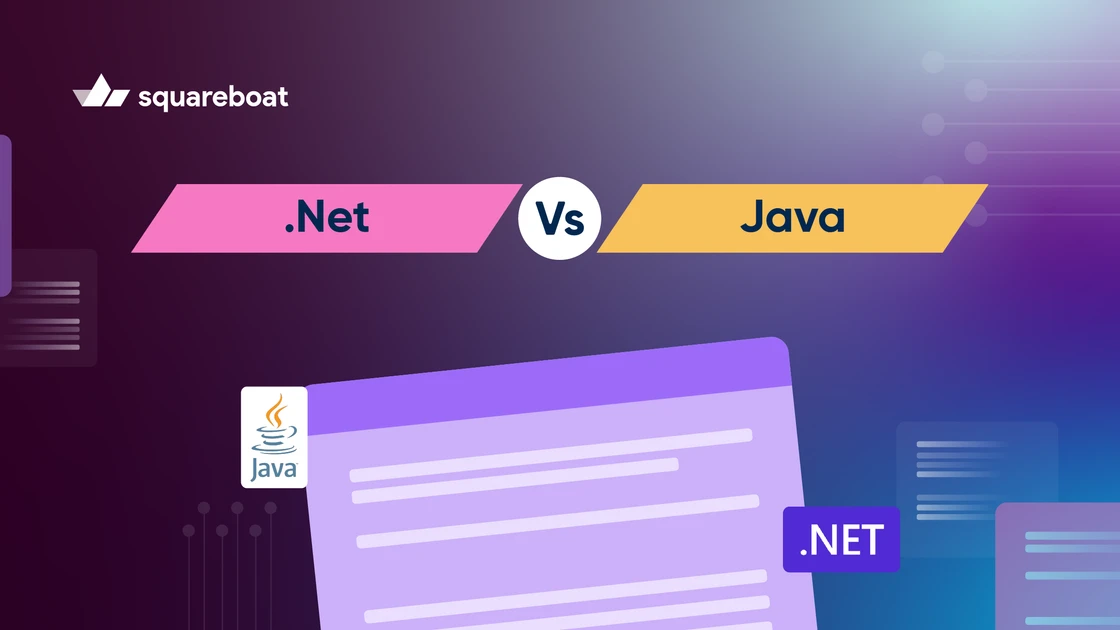There are two dominant development platforms which are globally trusted and widely used in today’s rapidly evolving digital landscape, namely .NET & Java. .NET is a Microsoft framework primarily used for building backend and web applications, while Java is a versatile platform-independent programming language commonly used in enterprise and backend development. Both platforms have their own strengths and weaknesses. From a business viewpoint, making the right choice often boils down to factors such as performance, scalability, cross-platform compatibility, availability of resources, budget constraints, and specific project requirements. This article discusses the similarities as well as the differences between .NET and Java, along with the essential considerations involved in choosing the right platform for your upcoming business requirements.
What is .NET?
.NET is a free and open-source software development framework offered by Microsoft, used by over 6 million developers worldwide to build versatile applications across multiple platforms. It supports over 25 programming languages, including C#, C++, F#, Visual Basic, and more. It provides various tools and libraries to build a wide range of applications such as web applications, desktop applications, mobile applications, cloud-based services & IoT as well.
Top Features That Make .NET Stand Out
.NET is such a powerful and popular framework among developers. Here's a detailed look at the features that make it a top choice.
Interoperability of Languages
.NET allows developers to use multiple programming languages within the same project. The Common Type System (CTS) allows different languages to interact with each other & supports data sharing across the languages.
Cross-Platform Support
Applications once developed in .NET framework can be deployed on multiple operating systems, and this means developers don’t have to worry about writing different code for different operating systems.
Framework Class Library (FCL)
The FCL is a collection of components such as pre-defined reusable classes, interfaces & types. It is like a toolbox provided by Microsoft, which consists of ready-made code to help developers in building applications faster & more efficiently.
Common Language Runtime (CLR)
The CLR is a component of the .NET framework responsible for compiling & executing the code written by the developers. The CLR is capable of running code written in different languages in one go. It is like an engine that is responsible for running the code.
Automatic Memory Management
The CLR has a feature called the garbage collector, which automatically allocates memory when required & de-allocates when no longer in use, and this means that developers don’t have to worry about manually allocating or deallocating memory in languages like they usually do in C or C++.
Enhanced Security Features
The .NET framework comes with a series of built-in security features and authentication mechanisms that can prevent unauthorized access to your applications and protect sensitive user data. One such example is HTTPS, which ensures that sensitive data is encrypted while being transferred & well protected against being intercepted.
Integration with Cloud
The .NET framework provides tools such as Software Development Kits (SDKs) & APIs, which can help in integrating your applications with cloud-based services such as Microsoft Azure, Amazon Web Services, Google Cloud, etc.
Modern Development Tools
The .NET Framework supports IDEs like Visual Studio and Visual Studio Code for developing applications. These tools provide support for development, deployment & debugging the applications.
What is Java?
Java is a high-level programming language & computing platform developed by Sun Microsystems in 1995. It is designed to be platform-independent, meaning Java programs can run on any device equipped with a Java Virtual Machine (JVM). It follows an object-oriented paradigm, in which programs are organized into classes and objects representing real-world entities. Applications once developed using Java can be used on any device that has a compatible JVM, enabling the famous ‘write once, run anywhere’ capability.
Top Java Features That Define Java's Versatility and Strength
When it comes to versatile programming languages, Java stands out thanks to its rich feature set. Here's a list of core features of Java that power Java applications everywhere.
Platform Independence
Java follows a philosophy of “write once, run anywhere”. The code, once written in Java, is compiled into bytecode that can run on any platform or device having a Java Virtual Machine without the need for modification or rewriting.
Object-Oriented
Java is a fundamentally object-oriented programming language, which means it allows developers to model real-world entities using classes and objects. This approach simplifies problem-solving by breaking down applications into manageable components.
Simple Syntax
The syntax of Java shares a lot of similarities with C/C++, but it doesn’t support complex features like pointers as well as operator overloading. This means that Java is easier to learn for someone familiar with C.
Robust and Secure
Java is well-known for its reliability and early detection of errors, along with its exception handling and automatic memory management capabilities. On the security front, Java offers a multilayered approach to protecting applications.
Multithreading Support
Programs written in Java are capable of handling multiple tasks simultaneously, which makes it a highly useful language for developing high-performance & responsive applications.
Automatic Memory Management
Java handles memory management automatically through its built-in garbage collector. It runs in the background to identify and remove objects that are no longer needed.
Distributed Computing Support
Java comes with built-in support for technologies like Remote Method Invocation & Socket Programming, which makes it an excellent choice for organizations seeking to develop distributed applications.
Difference Between .NET and Java
The .NET vs Java continues to remain as one of the highly debated comparisons when it comes to developing enterprise software applications. While both platforms are versatile and powerful enough for which they are widely adopted for development, there are significant differences between the two in several key areas that can influence critical business decisions, along with their outcomes.
In this section, we will understand the difference between .NET and Java to help organisations determine which platform can be the best fit for their business objectives.
Features | .NET | Java |
Type | It is a framework which supports multiple programming languages. | It is a programming language in itself. |
Platform Dependency | Originally Windows-only, but now comes with cross-platform support with .NET Core. | It is independent of any platform. |
Runtime Environment | The Common Language Runtime supports execution of code written in C#, F# & Visual Basic. | The Java Virtual Machine supports the execution of programs written in Java. |
Garbage Collection | .NET has a more efficient garbage collection mechanism. | Java’s garbage collection mechanism is less efficient. |
IDE | The .NET works best with Visual Studio & Visual Studio Code | Java works best in Eclipse, NetBeans & IntelliJ IDEA |
Performance | Generally faster | Faster with good JIT compilation |
Open source | Yes | Yes |
Development Speed | Supports rapid application development. | Development in Java can be time-consuming. |
Security | Comes with built-in security features. | Comes with security features but also depends on developer best practices. |
Database connection | The .NET framework uses a data access technology called ADO.NET to manage database connections. | Java uses an API called Java Database Connectivity (JDBC) for managing database connections. |
Demand for Developers | While demand for .NET developers is increasing, the number of available positions is lower compared to that of Java developers. | The demand for Java developers continues to remain high. |
Market Share | The .NET framework takes the lead in for use in web-based applications. | Java continues to be a dominant force for use in non-web & enterprise-based applications. |
Pros & Cons of .NET
Pros:
- The .NET Framework offers excellent support for building Windows-based applications. With the introduction of .NET Core, developers can build applications that can run on Windows, Linux, & MacOS as well due to the cross-platform support it offers.
- It has greater community support, rich libraries & larger ecosystem to enable rapid application development.
- .NET offers a high-performance runtime & efficient memory management mechanism for building scalable applications.
- Programs written in multiple languages can seamlessly interact with each other and share data since the .NET framework supports the interoperability of languages.
The built-in security features in the .NET Framework make it an excellent choice to protect sensitive data & prevent unauthorized access.
Cons:
- The learning curve can be steep for beginners, even if it is easy to learn.
- Large or complex .NET-based applications can have scalability issues.
While .NET is open source, some tools or features may require license costs to be paid for, which means cost estimation can be challenging.
Pros & Cons of Java
Pros:
- Java is platform-independent. Code once written in Java can run on any device that has a JVM installed, irrespective of the OS.
- Java has a rich library which consists of pre-defined classes & functions for some common tasks such as database operations, networking operations along with GUI development.
- Java comes with built-in multi-threading support, which enables programs to execute multiple tasks at the same time.
The security features of Java make it an excellent choice for web-based as well as network-based applications.
Cons:
- Java applications can perform poorly in comparison to applications or programs written in other languages.
- Java applications consume more memory than those written in other languages.
- Java syntax is quite verbose, which can make it difficult to read & write. Beginners without prior programming experience may find it challenging to master due to its syntax.
The support for low-level programming languages in Java is very poor because it is a high-level programming language.
Conclusion
There’s no universal winner in the .NET vs Java debate because both platforms have stood the test of time & still continue to evolve while proving themselves as robust, reliable, and versatile platforms for modern software development. Choosing the right platform is all about your long-term business goals. If your business mainly focuses on the Microsoft-based ecosystem, then .NET is the natural fit. If you are eyeing scalability & cross-platform compatibility, then Java continues to be an unbeatable contender.
Start by evaluating key factors, such as your existing business challenges, long-term growth goals, and the budget. Ultimately, the best choice between .Net and Java depends on which platform aligns with your long-term vision, enabling your business to optimise processes, respond swiftly to market shifts, and maintain a competitive edge, while delivering value to users.


